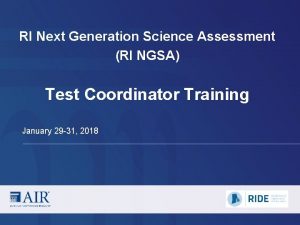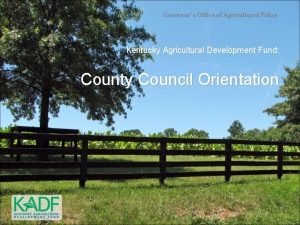Historical Agricultural Use Policy State of Rhode Island

















- Slides: 17

Historical Agricultural Use Policy State of Rhode Island Department of Environmental Management Office of Waste Management Policy Memo 2014 -01 Guidelines for the Management of Historically Agricultural Properties for Future Use as Open Space and/or Recreational Land

Background � Several other states have addressed this issue (NJ, OR, CA, CT) � Intent: provide streamlined, practical, and economically feasible options for managing historically agricultural properties while simultaneously maintaining the Department’s overall mission of protecting human health and the environment. � Common Hurdles ◦ Site Size ◦ Wide-spread application of pesticides resulted in jurisdictional levels

Data Analysis � Soil sampling data from 15 appropriate sites on file � Sample depth 0 – 1’ bgs � Applicable Contaminants ◦ ◦ Arsenic Lead Dieldrin Chlordane

Lead (RDEC – 150 ppm, I/CDEC – 500 ppm) Site Size # Samples # >RDEC # >I/CDEC Avg. (ppm) Range (ppm) Orchard 1 93 39 3 1 66. 59 ND – 674 Orchard 2 106 Orchard 3 50 7 None 46. 36 ND – 138 Orchard 4 13. 6 15 None 14. 68 6 – 46 Orchard 5 11. 6 Orchard 6 6. 3 2 None 67. 65 5. 3 – 130 Row Crops 7 17 9 None 20. 2 8. 5 – 28. 9 Row Crops 8 57 28 None 18. 2 ND – 38 Row Crops 9 4. 5 7 None 11. 1 8 – 23 Orn. /Nursery 10 14 None 11. 9 5. 3 – 22 Orn. /Nursery 11 8 13 None 9. 14 2. 7 – 20 Orn. /Nursery 12 1. 4 13 6 None 162 7. 2 – 390 Orn. /Nursery 13 0. 59 2 None 38 19 – 57 Orn. /Nursery 14 1. 6 Unknown Ag. 15 6. 3 23 19. 6 – 25. 4 Not Analyzed 5 None ND (non-detect) results evaluated at one half the laboratory MDL/MRL value None

Arsenic (RDEC – 7 ppm, I/CDEC – 7 ppm) Site Size # Samples # > 7 ppm % > 7 ppm Avg. (ppm) Range (ppm) Orchard 1 93 34 12 35% 9. 19 ND – 72. 1 12. 04 A Orchard 2 106 332 129 39% 7. 63 ND – 62. 4 12. 04 A Orchard 3 50 65 53 82% 30. 1 ND – 133 12. 04 B Orchard 4 13. 6 15 3 20% 4. 82 1. 2 – 21 NJD 1, 2 Orchard 5 11. 6 49 2 4% 2. 92 0. 76 – 16 NJD 1 Orchard 6 6. 3 24 18 75% 48. 8 0. 85 – 140 Row Crops 7 17 30 6 20% 5. 72 2. 9 – 12. 7 Row Crops 8 57 19 7 37% 6. 32 1. 6 – 13 Row Crops 9 4. 5 13 1 8% 3. 6 1. 4 – 9. 3 NJD 2 Orn. /Nursery 10 14 1 7% 4. 14 1. 7 – 7. 1 NJD 2 Orn. /Nursery 11 8 32 7 22% 5. 16 ND – 21 NJD 1 Orn. /Nursery 12 1. 4 13 11 85% 11. 3 2. 8 – 23 12. 04 A Orn. /Nursery 13 0. 59 67 25 37% 7. 96 ND – 36 12. 04 A Orn. /Nursery 14 1. 6 28 26 93% 9. 71 6 – 18 12. 04 A Unknown Ag. 15 6. 3 11 none 4. 95 2. 2 – 6. 6 1 – Site would be non-jurisdictional per Rule 12. 03 with “hot-spot” removal 2 – Site does not meet the minimum sample requirements for Rule 12. 03 ND (non-detect) results evaluated at one half the laboratory MDL/MRL Value NJD per Rule 12. 03 Rule 12. 04 options NJD 12. 04 A NJD 2

Dieldrin (RDEC – 0. 04 ppm, I/CDEC – 0. 4 ppm) Site Size # Samples # >RDEC # >I/CDEC Avg. (ppm) Range (ppm) Orchard 1 93 34 9 1 0. 048 ND – 0. 42 Orchard 2 106 Orchard 3 50 8 3 None 0. 049 ND – 0. 152 Orchard 4 13. 6 8 4 2 0. 42 ND – 1. 7 Orchard 5 11. 6 Orchard 6 6. 3 20 17 12 0. 529 0. 004 – 2. 6 Row Crops 7 17 8 None ND ND Row Crops 8 57 26 6 None 0. 021 ND – 0. 1 Row Crops 9 4. 5 13 None ND ND Orn. /Nursery 10 14 9 1 0. 099 ND – 0. 51 Orn. /Nursery 11 8 22 None 0. 002 ND – 0. 024 Orn. /Nursery 12 1. 4 9 3 None 0. 034 ND – 0. 17 Orn. /Nursery 13 0. 59 Not Analyzed Orn. /Nursery 14 1. 6 Not Analyzed Unknown Ag. 15 6. 3 Not Analyzed ND (non-detect) results evaluated at one half the laboratory MDL/MRL value

Chlordane (RDEC – 0. 5 ppm, I/CDEC – 4. 4 ppm) Site Size # Samples # >RDEC # >I/CDEC Avg. (ppm) Range (ppm) Orchard 1 93 34 None ND ND Orchard 2 106 Orchard 3 50 7 None ND ND Orchard 4 13. 6 4 1 None 0. 932 ND – 1. 3 Orchard 5 11. 6 Not Analyzed Orchard 6 6. 3 Not Analyzed Row Crops 7 17 8 None ND ND Row Crops 8 57 26 4 None 0. 292 ND – 1. 6 Row Crops 9 4. 5 13 None ND ND Orn. /Nursery 10 14 None 0. 046 ND – 0. 32 Orn. /Nursery 11 8 28 2 None 0. 179 ND – 1. 6 Orn. /Nursery 12 1. 4 1 None ND ND Orn. /Nursery 13 0. 59 Not Analyzed Orn. /Nursery 14 1. 6 Not Analyzed Unknown Ag. 15 6. 3 Not Analyzed ND (non-detect) results evaluated at one half the laboratory MDL/MRL value

Conclusions from Data Analysis � Lead ◦ Of 154 samples, only 6% exceeded RDEC ◦ Just 1 sample exceeded I/CDEC � Arsenic ◦ Approx. half of the sites could meet the requirements to be considered NJD for arsenic per Rule 12. 03, though three would need limited “hot-spot” removal ◦ The remainder of the sites could use the remedial options under Rules 12. 04 A or 12. 04 B

Conclusions from Data Analysis � Dieldrin ◦ 10 sites sampled for dieldrin ◦ Detected above RDEC in 31% of samples, 10% >I/CDEC ◦ When detected, site wide averages of dieldrin seemed to hover around the RDEC � Chlordane ◦ Sampled for on 9 sites, detected above RDEC on 3 ◦ No I/CDEC exceedances ◦ Avg. chlordane levels were below RDEC on all 9 sites

Other Findings. . � Vast majority of exceedances were considered “low-level” exceedances � Average contaminant concentrations were lower than expected � Ag policy inspired by Rule 12

Applicability � Sites or portions of sites where pesticides were historically applied and only COCs are lead, arsenic, dieldrin, and/or chlordane � End use: ◦ Undeveloped open space (not for recreational use) ◦ Passive Recreation ◦ Active Recreation

Not Applicable To: � Spills or other activities that would constitute a “release” under CERCLA � “Hot-spots” or concentrated areas of the Ag COCs attributed to spills, leaks, or improper disposal � Areas not utilized as agricultural fields � Areas that have been redeveloped � Any contaminants other than lead, arsenic, dieldrin, or chlordane

Process � Notification to the Department � Conduct Limited SI for Ag COCs if: ◦ Phase I ESA demonstrates the site or portion of the site subject to the policy was used only for agricultural purposes. ◦ Minimum sampling requirements are met ◦ End result will be a No Further Action Letter relative to the Agricultural Contaminants of Concern � Submit Agricultural Property SIR/RAWP � Program Letter Public Notice RDL/RAL

Sampling Requirements � Protocol: ◦ Sample for Ag COCs ◦ Discrete grab samples from 0 -1’ bgs ◦ Located within the applicable areas � Frequency: ◦ 1 acre – 8 samples minimum ◦ 1 to 5 acres – 8 samples + 2 per additional acre over 1 st acre ◦ Over 5 acres – 16 samples + 1 per additional acre over 5 th acre

Remedial Options � ELUR/SMP restricting the site or portions of the site to specific use � Must meet specific conditions depending on end use ◦ For example: A passive recreation area must meet the following conditions with respect to chlordane: �No individual sample shall be greater than 4. 4 ppm (I/CDEC) �No greater than 25% of samples shall exceed 0. 5 ppm (RDEC) �The average chlordane concentration shall be below 0. 5 ppm (RDEC)

Benefits of Ag Policy � Offers an alternative to the standard capping remedial approach for large sites that contain lower levels of the Ag COCs as a result of years of proper pesticide use � Allows for averaging of soil data � Combined Ag SIR/RAWP expedites the process to obtain an NFA � Can be used on entire or portions of former Ag sites � Alternative to Residential or I/C reuse

Acknowledgements � RISEP Legislative/Regulatory Sub-Committee � Patrick Cavanagh, URI – Intern � Matt De. Stefano & Leo Hellested, RIDEM/OWM
 Ri business development
Ri business development Ngsa science test
Ngsa science test Ri board of governors
Ri board of governors Interesting facts rhode island
Interesting facts rhode island Dr pradeep chopra
Dr pradeep chopra Galinha rhode island red
Galinha rhode island red Medical transportation management rhode island
Medical transportation management rhode island Rigl §44-30-12(c)(8)
Rigl §44-30-12(c)(8) Rhode island environmental police
Rhode island environmental police Ricas accommodations and accessibility features manual
Ricas accommodations and accessibility features manual Stem cell therapy rhode island
Stem cell therapy rhode island Ricas reference sheet
Ricas reference sheet Rhode island comprehensive assessments system
Rhode island comprehensive assessments system Rhode island comprehensive assessments system
Rhode island comprehensive assessments system Rhode island stormwater manual
Rhode island stormwater manual Nonemergency medical transportation
Nonemergency medical transportation Ky office of ag policy
Ky office of ag policy Credit safw
Credit safw































